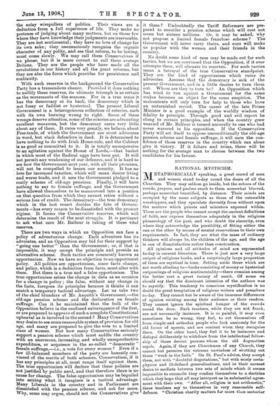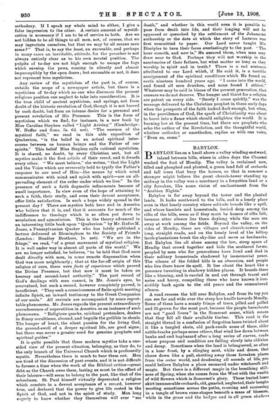RATIONAL MYSTICISM.
METAPHORICALLY speaking, a great crowd of men and women stand to-day round the doors of all the Churches. They may seldom go inside, but the echoes of the creeds, prayers, and psalms reach to them somewhat blurred, perhaps somewhat beautified, by distance. Their minds are occupied by the same subjects as those of the ostensible worshippers, and they speculate devoutly from without upon the matters which priests and ministers expound within. These are the people who cannot accept the ancient definitions of faith, nor express themselves adequately in the religious phraseology of the past, and who doubt the sincerity, even where they acknowledge the possibility, of fitting either the one or the other by means of mental reservations to their own requirements. In fact, they are what the mass of ordinary thinkers will always be, the children of the age, and the age is one of dissatisfaction rather than construction. METAPHORICALLY speaking, a great crowd of men and women stand to-day round the doors of all the Churches. They may seldom go inside, but the echoes of the creeds, prayers, and psalms reach to them somewhat blurred, perhaps somewhat beautified, by distance. Their minds are occupied by the same subjects as those of the ostensible worshippers, and they speculate devoutly from without upon the matters which priests and ministers expound within. These are the people who cannot accept the ancient definitions of faith, nor express themselves adequately in the religious phraseology of the past, and who doubt the sincerity, even where they acknowledge the possibility, of fitting either the one or the other by means of mental reservations to their own requirements. In fact, they are what the mass of ordinary thinkers will always be, the children of the age, and the age is one of dissatisfaction rather than construction.
All opinions and all attitudes of mind are represented to-day in eurrent literature. There is just now a very large output of religious books, and a surprisingly large proportion of them are mystical in tone. Setting aside those which are not worth alluding to—books consisting of moony or hysterical outpourings of religious sentimentality—there remains among the better sort a great variety of merit. Of some we should say that the dominant intention of the authors was to mystify. This tendency to conscious mystification is no doubt the great temptation of religious writers and preachers to-day. They cannot but be aware of the immense differences of opinion existing among their audience or their readers. They cannot ignore the spiritual hunger of the crowds round the door. Such teachers, while they are not frank, are not necessarily insincere. It is so painful, it may even sometimes be so wrong, they feel, to cut themselves off from simple and orthodox people who look anxiously for the old forms of speech, and are content when they recognise them. On the other band, they feel it to be insincere and disloyal deliberately to withdraw from the intellectual fellow- ship of those devout persons whom the old dogmatism repels. Again, if they are Churchmen of any Church, they cannot but perceive the extreme unwisdom of shutting out those "weak in the faith." On St. Paul's advice, they accept them, not with "doubtful disputations," but with misty meta- physics and ill-defined generalisations, and in their earnest. desire to mediate between two sets of minds which it seems impossible to reconcile they confine themselves to a doctrine which they hope that all may interpret as in substantial agree- ment with their own. " After all, religion is not arithmetic," these teachers say to themselves in very reasonable self- defence. "Christian charity matters far more than sectarian
orthodoxy. If I speak my whole mind to either, I give a false impression to the other. A certain amount of mystifi- cation is necessary if I am to be of service to both. Are we not bidden to be all things to all men, not, of course, that we may ingratiate ourselves, but that we may by all means save
some " That is, to say the least, an excusable, and perhaps in many cases an inevitable, attitude, for the preacher is not always entirely clear as to his own mental position. The pulpits of to-day are not high enough to escape the fogs which envelop the pews, coming in silently and almost imperceptibly by the open doors ; but excusable or not, it does not represent true mysticism.
Any review of the mysticism of the past is, of course, outside the scope of a newspaper article, but there is a mysticism of to-day which no one who discusses the present religious position can neglect to take into consideration. It is the true child of ancient mysticism, and springs, not from doubt of the historic revelation of God, though it is not barred by such doubt, but from an intense desire for a personal and present revelation of His Presence. This is the form of mysticism which we find, for instance, in a new book by Miss Caroline Stephen called " Light Arising " (Cambridge : W. Heifer and Sons, 3s. 6d. net). " The essence of the mystical faith," we read in this able exposition of Quakerism, " is the belief in an actual spiritual inter- course between us human beings and the Father of our spirits." This belief Miss Stephen calls rational mysticism. It is shared, no doubt, by every Christian sect, but all mystics make it the first article of their creed, and it dwarfs every other. " We must believe," she writes, " that the Light and the Voice which are reverently held to typify the Father's response to our need of Him—the means by which mind communicates with mind and spirit with spirit—are an all- pervading element of the order under which we live." In the presence of such a faith dogmatic refinements become of small importance. In view even of the hope of attaining to such a faith, their study, and even their devout acceptance, offer little satisfaction. Is such a hope widely spread in the present day ? There are mystics both here and in America who believe that it is, and that it accounts for much of the indifference to theology which is so often put down to secularism and agnosticism. This is the theory advanced in an interesting little book upon " Quakerism " by Mr. Rufus M. Jones, a Pennsylvanian Quaker who has lately published a lecture delivered at Birmingham to the Society of Friends (London : Headley Brothers, ls. net). " We are in the fringe," we read, " of a great movement of mystical religion. It is well under way in almost all parts of the world." We are no longer satisfied, be believes, "to be told that God once dealt directly with men, in some remote dispensation when God was more neighbourly ; that at the far-off origin of this religion of ours, there were facts of experience which proved the Divine Presence, but that now it must be taken on hearsay and second-hand authority." The past record of God's dealings with men cannot, in Mr. Jones's eyes, be overvalued, but such a record, however completely proved, is insufficient "They seek a consciousness of finite spirit meeting infinite Spirit, an inward testimony to the Great Companion of our souls." All revivals are accompanied by some regret- table phenomena. Mr. Jones regards the present extraordinary recrudescence of superstition in America as an instance of such phenomena. " Religious quacks, spiritual pretenders, dealers in flimsy occultisms, abound, and beguile the gullible in shoals. The hunger of heart, the silent passion for the living God, the ground-swell of a deeper spiritual life, are good signs ; but there was never a greater need for genuine prophets and spiritual guides."
It is quite possible that these modern mystics take a one- sided view of the present situation, belonging, as they do, to the only branch of the Universal Church which is professedly mystic. Nevertheless there is much to bear them out Men are tired of the discussion of past events, and it is not difficult to foresee a time when the work of the Biblical critics—great debt as the Church owes them, lasting as must be the effect of their labours—will seem to belong to the past, like that of the schoolmen. St. Paul himself virtually deprecated a religion which consists in a devout acceptance of a record, however true, and declared that the power to give life rested in the Spirit of God, and not in the spirit of study. Men long eagerly to know whether they themselves will ever "see
death," and whether in this. world even it is possible to pass from death into. life, and their longing will not be appeased or quenched by the settlement of the Johanniae authorship or the date at which the story of Laetrile Was first committed to paper. Our Lord never taught His Disciples to turn their faces everlastingly to the past. " The hour eometh, and now is," He assured them, when men may draw near to God. Perhaps they. will not worship in the sanctuaries of their fathers, but what matter so long as they worship in spirit and in truth ? There is a sad sentence attributed to our Lord which, if He said it, is a terrible arraignment of the spiritual conditions which He found on earth nineteen hundred years ago. " I came into the world, and found all men drunken, and none found I athirst." Whatever may be said in blame of the present generation, that censure we do not deserve. The hunger and thirst for a religion are patent on every side. "Surely I come quickly," was the message delivered to the Christian prophet in those early days when the prospects of the faith looked dark enough, but when, in the providence of God, the spark of Christianity was about to burst into a flame which should enlighten the world. It is burning low at the present time, but there are prophets who echo the author of the Revelation, and the thoughtful world, whether orthodox or unorthodox, replies as with one voice, " Even so, oothe."







































 Previous page
Previous page